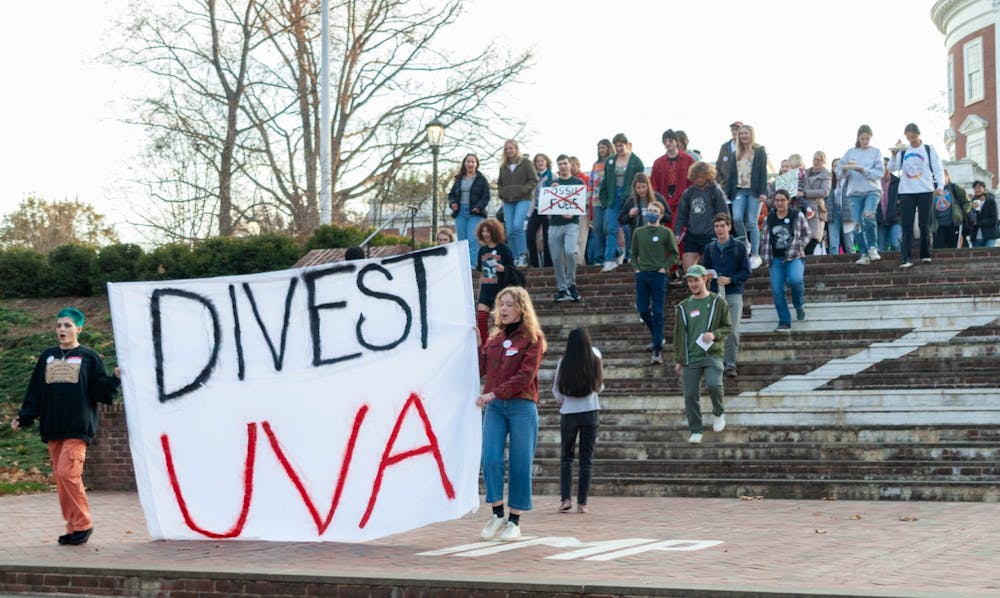DivestUVA is a student group aiming to pressure the University to stop funding fossil fuels. The group’s most recent statement demands a comprehensive report of University of Virginia Investment Management Company — the financial board that leverages the University 14.5 billion dollar endowment — fossil fuel investments and immediate divestment from companies whose primary profit comes from fossil fuels extraction. As of Jan. 5, this petition has over 1,200 signatures. Unfortunately, DivestUVA’s petition has not spurred UVIMCO to take up any actionable plans of divestment. Despite UVIMCO’s inaction, I too believe there should be transparency in fossil fuel investments — still, divestment should be a process of case-by-case analysis.
UVIMCO may be a private entity, but it should be subject to accountability. This group of 11 individuals leverages the University’s $14.5 billion dollar endowment and only seats one University representative — Chief Operating Officer J.J. Davis. I understand the desire to adorn the group with economically-vetted affiliates with ties to financial firms such as Bain Capital and BlackRock Alternative Investors. That being said, if we are going to have outsiders manage the endowment, the University’s staff and students deserve to at least know how that funding is being split and held. UVIMCO is long overdue for a comprehensive report highlighting where investments lie.
If we know where our investments are situated, we can make a better analysis of the merit of the companies we fund via our endowment. What if a comprehensive report finds UVIMCO is invested in the oil company Shell? The Royal Dutch Shell makes the majority of its profit off the oil and gas trade. In 2020, the company raked in $2.6 billion just in oil and gas profits. DivestUVA says that since Shell profiteers primarily from fossil fuels, there is ample reason for divestment from Shell. Yet, if we do more research into Royal Dutch Shell, we find that although more than 50 percent of their profit comes from non-renewables, Shell is making a notable turn in its capital investments toward renewables. Since 2016, Shell has been investing two to three billion dollars annually towards its projects in its “Renewables and New Energy Solutions” division. This plan matches what Royal Dutch Shell made from its oil and gas trade in 2020.
What DivestUVA seems to overlook is that when the world goes green, those at the forefront will most likely be the oil and gas companies that have converted their capital to renewable means. In a report by CNN, research firm MorningStar states, “Oil companies need to go green to remain competitive.” I absolutely agree. It is proven in practice. On Dec. 17, Shell announced completion of its acquisition of Savion, one of the largest developers of solar and energy storage in the United States. Companies that are going to great lengths to provide two to three billion dollars a year into research and development on renewable energies, while acquiring leaders in the market, are companies to be invested in. Sure, maybe in 2022 these companies are deemed oil and gas companies, but in the future, they will be pioneers in green technology. With this in consideration, for DivestUVA to say that the University should “follow through on this promise with complete divestment from fossil fuels by Dec. 31, 2022” is economically unsavvy.
I am onboard with DivestUVA to lobby the University administration to encourage transparency in the investments of UVIMCO. Once a comprehensive report of investments is attained, we should condemn those who are not investing in renewable capital and reward those who are with our investment. If we hasten to eliminate all investments who profiteer off non-renewables, we are doing ourselves a disservice. We should invest in companies who are mobile. That is those who are moving their cash flow and capital resources to renewable energy, while incrementally decreasing fossil fuel use. Moreover, shifting monetary assets to investment in promising renewable companies compounds returns at a greater rate than fossil fuels. To this point, the Imperial College London and International Energy Agency took a look at five to 10 year returns on stocks and found, “Renewable energy investments are delivering massively better returns than fossil fuels in the U.S., the U.K. and Europe.” Let us satisfy social demand while simultaneously satisfying our economic agenda.
Rylan Dawson is an Opinion Writer for The Cavalier Daily. He can be reached at opinion@cavalierdaily.com.
The opinions expressed in this column are not necessarily those of The Cavalier Daily. Columns represent the views of the authors alone.







